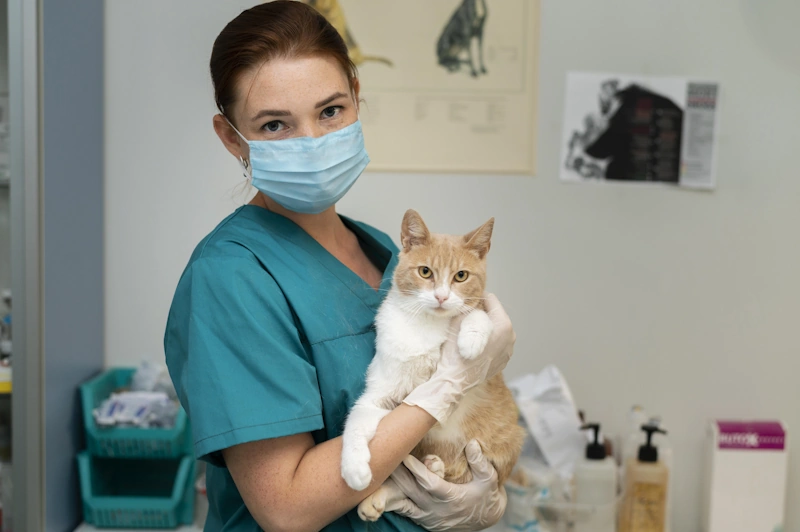How often do you take a cat to the vet? The frequency of veterinary visits for your feline companion is contingent upon its age, with distinct medical needs arising at different life stages. For kittens, a proactive approach is paramount.
How often do you take a cat to the vet? These furry bundles of energy necessitate frequent visits to the vet, typically every three to four weeks, until they reach the pivotal milestone of around four months of age.
These early veterinary consultations serve multifaceted purposes, including monitoring their growth and development, administering deworming treatments to purge any parasites inherited through maternal milk, and ensuring they receive the essential vaccinations vital for their well-being.
How often do you take a cat to the vet? As your cat transitions into adulthood, the routine adjusts to a more moderate pace. Adult cats typically require an annual wellness exam to evaluate their health and address emerging concerns. While the vigor of youth may mean fewer medical visits, occasional consultations may arise to address specific illnesses or issues that may crop up unexpectedly.
How often do you take a cat to the vet? A more vigilant healthcare regimen becomes imperative for our senior feline friends aged 12 or older. These wise companions should ideally visit the veterinarian every six months or more frequently if they contend with known medical conditions.
The advanced age of senior cats brings various potential health challenges, necessitating comprehensive veterinary attention. Yearly blood work, urine tests, and blood pressure measurements become essential for these visits, aiming to detect and manage age-related ailments such as kidney issues, hypertension, hyperthyroidism, and cardiac concerns.
Signs You Should Take Your Cat to the Vet
How often do you take a cat to the vet? Recognizing the signs that indicate your feline companion may need a trip to the vet is crucial for proactive pet care. While cats are known for their independent nature, changes in behavior and physical health should never be overlooked. Here’s an in-depth exploration of various signs that warrant a visit to the veterinarian:
Expressive Distress:
How often do you take a cat to the vet? Noticeable shifts in behavior, such as excessive howling, crying, or seeking refuge in hiding places, may indicate distress. Cats often communicate through their actions, and sudden vocalization or social behavior changes can indicate underlying issues.
Altered Litter Box Habits:
How often do you take a cat to the vet? Changes in litter box behavior are essential indicators of your cat’s health. If you observe abnormal habits such as frequent urination, straining, or, conversely, a reduction in litter box usage, it could signify urinary tract issues or other health concerns.
Repetitive Vomiting:
While occasional vomiting may be shared, repetitive or prolonged episodes require attention. Persistent vomiting could signify various ailments, including gastrointestinal problems or ingestion of a foreign object.
Unexplained Fatigue:
If your cat appears exceptionally lazy or tired, it’s a cause for concern. Cats are generally active and playful, so a sudden lack of energy may suggest an underlying health issue requiring professional evaluation.
Sudden Changes in Appetite:
How often do you take a cat to the vet? A sudden shift in your cat’s eating habits, whether notably increased or decreased appetite, can indicate dental issues, gastrointestinal problems, or metabolic disorders. Monitoring their food intake is crucial in gauging overall well-being.
Difficulty Moving:
Observing your cat dragging their back legs is a serious red flag. It could signify neurological issues, spinal problems, or injuries that require immediate veterinary attention for accurate diagnosis and prompt intervention.
Unusual Lumps or Growths:
How often do you take a cat to the vet? Regularly inspect your cat for any unusual lumps, bumps, or growths on their body. Any new or rapidly changing masses could indicate tumors, abscesses, or other medical conditions requiring professional assessment.
Coughing and Breathing Changes:
Respiratory symptoms such as persistent coughing, wheezing, or labored breathing are signs of potential respiratory issues, infections, or heart problems. These symptoms warrant prompt veterinary examination to ensure proper diagnosis and treatment.
Nose or Eye Discharge:
How often do you take a cat to the vet? Unexplained discharge from the nose or eyes may indicate respiratory infections or eye problems. Monitoring for ocular or nasal discharge changes is vital in identifying potential infections or underlying health concerns.
Trauma from Cat Fights:
If your cat has been involved in a fight with another cat and exhibits signs of trauma, such as wounds, limping, or behavioral changes, seek immediate veterinary attention. Infections from bites or injuries may not be immediately apparent but can escalate if left untreated.
Changes in Grooming Habits:
How often do you take a cat to the vet? Cats are meticulous groomers, and alterations in their grooming routines can be significant. A sudden decrease in grooming may indicate pain or discomfort, while excessive grooming may signal skin problems or stress.
Weight Fluctuations:
Regularly monitor your cat’s weight. Unexplained weight loss or gain can be indicative of various health issues, including metabolic disorders, digestive problems, or hormonal imbalances.
Altered Water Consumption:
How often do you take a cat to the vet? Changes in your cat’s water-drinking habits can be an essential clue. Increased thirst could indicate diabetes or kidney issues, while a sudden decrease may indicate dehydration or other underlying problems.
Foul Odors:
Unpleasant or unusual odors from your cat may indicate dental issues, gastrointestinal problems, or infections. Bad breath, in particular, can be a sign of dental disease that requires attention.
Behavioral Changes:
How often do you take a cat to the vet? Any abrupt alterations in your cat’s behavior, such as increased aggression, excessive restlessness, or withdrawal, may signify an underlying problem. Cats may not always show overt signs of distress, so subtle behavioral changes should be noted.
Pawing at the Mouth or Face:
Persistent pawing at the mouth or face could indicate dental issues or oral pain. Dental problems are common in cats and can lead to various health concerns if left unaddressed.
Changes in Sleeping Patterns:
Cats are known for their sleep patterns, but drastic changes, such as insomnia or excessive sleeping, may indicate discomfort, pain, or other health issues that require evaluation.
Uncharacteristic Agitation:
If your typically calm and composed cat becomes unusually agitated, it could be a response to pain, discomfort, or even stress. Investigating the cause with a veterinarian is crucial for understanding and addressing the root issue.
Noticeable Anxiety or Fear:
Cats may exhibit signs of anxiety or fear, especially during vet visits. However, if your cat displays prolonged or intensified anxious behavior, it’s essential to explore the underlying causes and address them for their well-being.
Don’t Wait Before Calling a Vet When You See These Signs
Is your feline friend showing signs of distress or discomfort? Don’t delay – their health is not just a priority; it’s our unwavering commitment.
Recognize the signs – your cat might be trying to communicate with you:
Lethargy: Unusual tiredness or lack of energy.
Changes in Appetite: Whether it’s an increase or decrease, sudden shifts could signal an underlying issue.
Difficulty Breathing: Labored breaths or any signs of respiratory distress.
Excessive Grooming: Obsessive cleaning behavior can indicate skin problems or stress.
Persistent Vomiting or Diarrhea: Frequent episodes can lead to dehydration and are red flags for various health issues.
Swift action is important for safeguarding your cat’s well-being. Our compassionate team at Sunshine Pet Hospital is on standby 24/7, ready to provide not just care, but expert attention tailored to your furry friend’s needs. In moments of uncertainty, we offer more than just medical assistance; we provide a haven where your pet’s comfort is paramount. Trust us to be there in every meow and purr, ensuring your beloved companion receives the prompt, professional, and caring attention they deserve.


